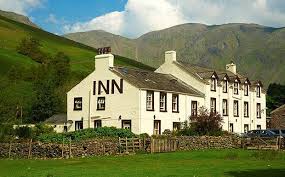记忆方法
记忆“inn”的方法是将其与“in”这个前缀联系起来,想象一个“n”延伸到里面,表示一个内部的空间或地点,这个空间是供人入住的,即小旅馆或客栈。这种方法通过将单词的形状与它所代表的概念联系起来,帮助你记忆这个词的含义。
以上内容由AI生成, 仅供参考和借鉴
中文词源
inn 小酒店,客栈
来自in,里面,入内。引申词义小酒店,客栈。
英语词源
- inn
-
inn: [OE] An inn was originally literally a place one lived or stayed ‘in’. It comes from a prehistoric Germanic *innam, which was a derivative of the ancestor of the modern English adverb in, and in Old English it meant simply ‘house where one lives, abode, home’. This sense survived into the 17th century (‘Queen Mary gave this House to Nicholas Heth, Archbishop of York, and his successors for ever, to be their Inne or Lodging for their Repair to London’, James Howell, Londinopolis 1657), and a memory of it remains in London’s Inns of Court, which originated as lodgings for lawyers.
The later sense ‘public house, tavern’ developed towards the end of the 14th century.
=> in - inn (n.)
- Old English inn "lodging, dwelling, house," probably from inne (adv.) "inside, within" (see in). Meaning "public house with lodging" is perhaps by c. 1200, certainly by c. 1400. Meaning "lodging house or residence for students" is early 13c. in Anglo-Latin, obsolete except in names of buildings that were so used (such as Inns of Court, mid-15c.).
权威例句
- 1. I always feel at home at Ye Olde Starre Inn.
- 在昨日星辰客栈,我总有种宾至如归的感觉。
- 2. The inn gift shop stocks quality Indian crafts and sundries.
- 旅馆的礼品店里备有上好的印度手工艺品和其他一些特色礼品。
- 3. A shuttle bus runs frequently between the Inn and the Country Club.
- 一辆区间公交车频繁地往返于这家旅馆和那个乡村俱乐部。
- 4. The Tides Inn is both comfortable and unpretentious.
- 泰得斯小酒店舒适而又简洁。
- 5. She washed her face at the pump in front of the inn.
- 她在客栈前的水泵旁洗了洗脸。
